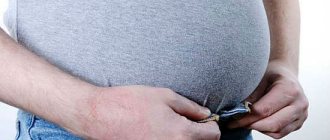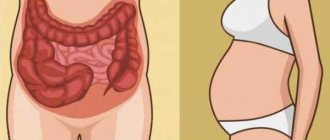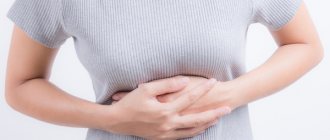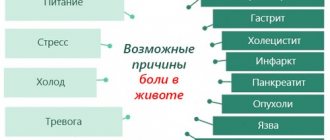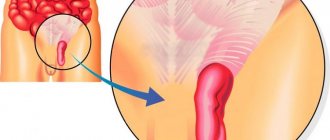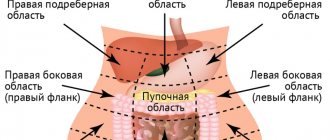Pulling in the lower abdomen in men: briefly about the reasons
Painful and unpleasant symptoms in the lower abdomen can be dull, sharp, cutting, cramping and stabbing. Sometimes the pain radiates to the leg, anus area and intensifies with physical activity or when visiting the toilet. Pain may worsen during urination and defecation.
Does the lower abdomen hurt in men? The reasons may be the following:
- cystitis;
- renal colic;
- venereal diseases;
- strangulated spinal hernia;
- appendicitis;
- intestinal inflammation;
- obstruction;
- prostate diseases;
- cancer of the prostate, testicles, penis.
Often the symptoms of all of the above diseases are similar. However, you should not start diagnosing yourself. It is better to take proactive steps regarding visiting a doctor. A urologist specializes in most of the diseases mentioned above. If the doctor suspects inflammation of the appendix or intestines, or oncology, he will refer you to the necessary other specialist.
Reproductive organs
The organs that provide the reproductive function can cause characteristic abdominal pain.
Pain in the lower abdomen in men associated with the genital area:
- Prostatitis is an infection in the prostate. Accompanied by painful trips to the toilet, increased body temperature, shooting spasms of the lower back and anus. A painless ultrasound examination is used to determine the extent of organ damage. Requires immediate attention to a urologist; it quickly becomes chronic.
- Adenoma is a benign neoplasm of growing prostate tissue. The source of trouble is hormonal imbalance. Frequent urge to go to the toilet, especially at night. Difficulty in draining urine. Requires examination by a urologist and surgeon.
- The development of cancer cells in the prostate is the appearance of malignant pathology in the tissues of the gland. It is impossible to determine with certainty what causes the disease. Diagnosed by laboratory methods by a urologist and oncologist.
- Vesiculitis is the development of inflammation in the seminal vesicle (unilateral or bilateral). The most likely cause of the disease is a sexually transmitted infection. It manifests itself as pain during ejaculation, in the suprapubic region and in the anus. Requires treatment with a course of antibiotics.
- Epididymo-orchitis is a disease of the testicle or appendage. It is acute. Patients complain of temperature and discomfort in the scrotum. In this case, hardness in the testicle and an increase in its volume are observed.
Treatment of these diseases requires medical supervision and threatens the development of impotence and infertility.
Prostatitis
If a man feels pain in his lower abdomen, the most common cause is prostatitis. During an exacerbation of this disease, it is the nagging nature of the pain that occurs.
Causes of prostatitis:
- infection (the disease is provoked by viruses, bacteria, fungi);
- due to stagnation of prostate secretions (with reduced immunity, hypothermia, lack of physical activity).
Among the pronounced symptoms are the following:
- pulls a man's lower abdomen;
- the pain comes sharply and with attacks;
- difficulty urinating (cramping occurs);
- discharge from the urethra.
During the course of this disease, an inflammatory process occurs in the prostate gland. Prostatitis is a fairly common disease. It affects every third man from 20 to 50 years old.
Localization of pain on the left
If the lower abdomen on the left side hurts in men, then perhaps we should talk about disorders of the internal systems of the body. It is recommended to pay attention to the localization of pain.
Does a man have a pulling sensation in his left lower abdomen? This area contains the sigmoid colon. The left ureter is located in the same part. The causes of pain may be hidden in diseases of these organs.
Let's consider typical ailments that make themselves felt in this area:
- Inflammation of the sigmoid colon. This disease is considered one of the most common acute intestinal inflammation. Nagging pain occurs due to structural features. There are bends in the inner surface of the intestine that make it difficult for the food consumed to pass through. The result is fecal stagnation and inflammation. Consequently, it pulls the left lower abdomen in men. Fatigue or weakness may appear as an additional symptom. The frequency and consistency of stool changes constantly.
- Diverticula of the sigmoid colon. This disease leads to the formation of pouches of pathological origin. The disease can manifest itself for various reasons, namely: constipation, rapid weight gain, bloating, taking certain laxatives, infections. The disease proceeds without significant manifestations. Only the man’s lower abdomen hurts. Nagging pain is accompanied by bloating, rumbling in the stomach, and flatulence.
- Irritable bowel syndrome. A disorder occurs in the intestines itself, which can last for several months. The disease occurs in men due to impaired contractions of the intestinal muscle tissue. As a result - pain in the lower abdomen, bloating, flatulence.
- Crohn's disease. This disease affects the digestive system. The disease mainly occurs due to chronic inflammation in the form of cracks and ulcers on various organs. Crohn's disease most often affects the intestines, large and small intestines. The man feels a sharp and severe pain in the lower abdomen. Vomiting, nausea, diarrhea and weight loss, general weakness and high fever may occur.
- Intestinal obstruction occurs due to disruption of the movement of incoming food from the stomach to the intestines. Food stagnation occurs. The reason for this condition is quite clear: a violation of motor activity in a separate section of the intestine. There may be a risk of a mechanical obstruction that impedes the movement of feces. Pain in the lower abdomen in men is cramping. Additional symptoms include nausea, constipation, bloating, vomiting and increased gas production.
- Oncological neoplasms in the sigmoid colon. A malignant tumor forms in this area. It begins its development from the cells of the mucous membrane. People who are most susceptible to this disease are those who have a genetic predisposition and chronic diseases of the intestines or colon. Main symptoms: abdominal pain on the left, nausea, vomiting, belching, gas formation. When diagnosing this disease, the patient’s stool must be examined. It contains streaks of blood or purulent inclusions.
- Urolithiasis is a disease that affects the kidneys, bladder and other vital organs.
- Stones that occur against the background of metabolic disorders. They interfere with the normal functioning of the genitourinary system. Severe acute pain in the lower abdomen when urinating. Stones are formed due to poor nutrition, lack of important vitamins and beneficial microelements. Injuries and diseases of the digestive and urinary systems are also among the causes of stone formation.
Possible reasons
Abdominal pain at night can be divided into 2 types. The first type is colic. These sensations can occur suddenly with varying frequency and intensity. They are usually accompanied by intestinal deformities. If the pain is sharp and severe, you need to call an ambulance.
The second type is constant, dragging and debilitating. Most often, such sensations are observed in cases of serious inflammatory diseases of the gastrointestinal tract.
Only a doctor can make an accurate diagnosis, but you can suspect the cause of the pain yourself, taking into account the location, nature, intensity of the pain and the presence of accompanying symptoms.
Gastritis
Gastritis is a disease characterized by inflammation of the gastric mucosa. With chronic gastritis, the pain has a dull, nagging character, and with exacerbation the pain becomes sharp, stabbing. The pain is localized in the upper abdomen, and most often the discomfort occurs after eating and subsides at night. Additional symptoms of gastritis are:
- No appetite;
- involuntary belching of air;
- Nausea, sometimes with vomiting.
If gastritis is suspected, you should contact a gastroenterologist to confirm the diagnosis and prescribe therapy. The most effective method for diagnosing gastritis is gastroscopy.
Treatment of gastritis consists of taking antibacterial drugs, antiseptic and regenerating agents, as well as following a diet.
Stomach ulcer
Gastric ulcer is a chronic pathology in which ulcerative lesions of the gastric mucosa are observed. The most common causative agent of the disease is Helicobacter pylori. Pain with a stomach ulcer is stable, aching in nature.
Pain occurs in the upper abdomen, mainly at night, in stressful situations and between meals.
After eating, the pain may return, but if the ulcer is located on the duodenum, eating, on the contrary, alleviates the condition. Additional symptoms of a stomach ulcer include:
- Frequent heartburn;
- sour belching;
- sour vomiting;
- hunger pains.
If you have these symptoms, you should seek help from a gastroenterologist. Diagnosis of gastric ulcer includes interviewing the patient, external examination with palpation, blood test, pH measurement, FGDS. Treatment of the disease consists of taking medications and following a diet.
In case of complications and frequent relapses, the patient is recommended to undergo surgical treatment.
GERD
GERD is a common disease of the stomach, which is accompanied by regular reflux of stomach contents into the esophagus. As a result, damage occurs to the mucous membranes of the esophagus and neighboring organs. Pain with GERD is often felt behind the sternum; it resembles the painful symptom of a heart attack and angina. Symptoms worsen after eating, physical activity, and at night. Associated symptoms are:
- Heartburn;
- sour belching;
- discomfort when swallowing food;
- difficulty swallowing.
If you have the above symptoms, you should consult a therapist or gastroenterologist.
Diagnosis of GERD includes a set of studies:
- Laboratory tests of blood and stool;
- proton pump inhibitor;
- daily pH control of the esophagus;
- ECG;
- Ultrasound;
- X-ray of the esophagus;
- Analysis for Helicobacter pylori.
Treatment of GERD consists of giving up bad habits, following a nutritional schedule, following a diet, taking medications as prescribed by a doctor, and limiting physical activity.
Parasitic drift
Signs of the presence of a parasitic mole are very similar to the symptoms of irritable bowel syndrome. The pain often resembles cramps, is localized in the middle or lower abdomen, and can be felt on one side. The main companions of parasite infection are flatulence and unstable stool. Associated symptoms:
- Muscle and joint pain;
- skin rashes;
- signs of anemia;
- weight change;
- sleep disturbance;
- chronic fatigue;
- decreased immunity.
If you suspect the introduction of parasites, you can contact a general practitioner, family doctor, or parasitologist.
Diagnosis of worm infection involves examining stool and blood tests for antigens to helminths. The patient is prescribed drugs that kill parasites. The medicine and dosage are selected individually.
Appendicitis
If the right lower abdomen pulls in men, near the abdominal region, then this is a clear sign of inflammation of appendicitis.
At the initial stage of the disease, nagging pain occurs. Gradually, as the pathology develops, the pain intensifies. Additional symptoms include nausea, vomiting, and impaired bowel movements. Often the patient lies on one side, with his legs tucked under him. Blood and urine tests show a high level of leukocytosis.
When the first symptoms appear, hospitalization of the patient in a surgical hospital is indicated.
General treatment recommendations
Acute abdominal pain of unknown origin requires prompt medical examination.
There are several methods to resolve the problem:
- drug therapy;
- surgical intervention;
- physiotherapy.
The use of drugs is based on three principles:
- Etiotropic therapy , which is aimed at destroying the source of the problem. In case of external infection, it fights it.
- Pathogenetic therapy is aimed at supporting the internal reserves of the body - increasing immunity, normalizing the functioning of the damaged organ, stabilizing metabolic processes.
- Symptomatic therapy , which is aimed at eliminating unpleasant manifestations. To relieve pain, NSAIDs (nonsteroidal anti-inflammatory drugs) based on paracetamol, diclofenac, nimesulide, and ibuprofen are used.
Pain in the lower abdomen in men, which can be solved surgically:
- For appendicitis, an appendectomy (removal of the ventricular appendix) is performed.
- A strangulated hernia is restored using hernioplasty, which can be performed in a closed manner (laparoscopy).
- Stones in the kidneys and ureters are eliminated using:
- Urethroscopy;
- External lithotripsy.
In combination with medications, in the absence of an acute process, doctors prescribe physiotherapeutic procedures. This type of treatment effectively relieves pain.
Diseases of the urinary system
Cystitis is usually called a female disease. Since the urethra in women is shorter and wider than in men, pathological microflora reaches the bladder faster.
However, men are not immune to this disease. Bladder inflammation often occurs as a complication of urethritis (inflammation in the urethra). The reasons are quite simple and understandable: STDs, hypothermia.
Consider the symptoms of cystitis and urethritis:
- severe pain and burning in the urethra;
- pain when urinating;
- the urine is cloudy, there are clots of pus in the contents;
- swelling of the urethra;
- lower abdominal pain;
- nausea.
This clinical picture is also typical during the passage of sand and stones in renal colic.
Pyelonephritis is inflammation of the kidneys. It develops against the background of dangerous infections entering the kidneys through the blood. In old age, pyelonephritis develops together with prostate adenoma. In rare cases, this disease acts as a complication after urolithiasis.
Signs of pyelonephritis: increased sweating, poor appetite, elevated body temperature. The nature of the pain in this disease is dull and drawing. Sometimes the pain may radiate to the lower abdomen. An additional symptom is severe discomfort when urinating. Urine with this disease is cloudy in color. There is an additional symptom to watch out for.
Rare causes of nighttime abdominal pain
There are other diseases that cause abdominal pain and cause patients to wake up in the middle of the night. Among them there are both extremely dangerous conditions that require immediate hospitalization in the intensive care unit, and diseases that, even with unbearable pain, require only planned conservative treatment.
Thus, pain in the upper abdomen in an elderly patient in the middle of the night, accompanied by a drop in blood pressure, rapid pulse, cold sweat, nausea, vomiting and even a single loose stool, may be a sign of acute myocardial infarction . This is not a very characteristic clinical picture for this disease, but it often occurs in people who have had diabetes for a long time. In this case, you should under no circumstances delay calling an ambulance and hospitalization.
A completely opposite example is when a child or teenager has a stomach ache at night, and this symptom is combined with a rash on the legs, swelling of the legs and feet, and pain in the joints. This clinic is characteristic of hemorrhagic vasculitis , or Henoch-Schönlein disease , an autoimmune disease that affects small vessels.
Pain in the abdomen occurs due to numerous hemorrhages from damaged blood vessels into the peritoneum, which contains a large number of pain receptors. Treatment of hemorrhagic vasculitis involves the use of drugs that suppress the overactive immune system - glucocorticoids, cytostatics, immunoglobulins and other agents.
Whatever the reasons for abdominal pain at night, the most important thing is to monitor your health and consult a doctor in a timely manner. Self-medication without preliminary diagnosis can lead to unpredictable consequences.
Lower back hurts
It happens that the pain affects the lumbar region and lower abdomen. Such symptoms indicate the following possible diseases:
- Renal colic develops against the background of urolithiasis, in which unpleasant painful sensations occur when urinating. The pain radiates to the genitals, leg, groin area and lumbar region. In this case, the man will need urgent medical attention.
- Cystitis is inflammation of the bladder.
- Appendicitis.
- Hernia in the groin area. With this disease, the internal organs of the peritoneum protrude into the groin area. The disease can be either painful or without pronounced symptoms. Due to the formation of protrusion of organs, severe pain occurs in the groin, lower back, and abdomen.
Lower back pain may occur due to the formation of orchitis. With this disease, the testicles in men become inflamed. They increase in size, turn red and swell. There is a nagging pain in the lower abdomen. In acute orchitis, the temperature rises to 39 degrees, in the chronic form - up to 38. Orchitis often occurs as a complication of gonorrhea, a viral disease, tuberculosis, brucellosis, and syphilis. If you do not seek help from a doctor in time, an abscess and infertility may develop.
Briefly about flatulence
Flatulence is the name given to increased gas formation in the intestines. Such processes constantly occur in the human body. Gases are formed as a result of digestion of food. Basically it is hydrogen and methane, sometimes sulfur and nitrogen, which have an unpleasant odor. And when hydrochloric acid interacts with pancreatic enzymes, carbon monoxide is formed. In addition, gases enter the intestines through the blood and are also swallowed during conversation or eating.
Every day, about 2 liters of gases are formed in the intestines of a healthy person. This is normal and does not cause discomfort. They are expelled through the rectum, which is called flatulence, sometimes through belching.
Natural release of gases can occur up to 20 times a day. It is usually painless, silent, and odorless. But even when this process becomes more frequent, an unpleasant odor or sound appears during flatulence, men usually do not pay attention to it. Although this can cause serious discomfort to others. In addition, frequent flatulence can be a symptom of digestive disorders.
Despite differences in the anatomy and physiology of the body, the causes of bloating and gas in men and women are almost the same. There are two forms of flatulence: physiological and pathological. In the first case, increased gas formation occurs due to overeating or consumption of certain foods. In this case, no special treatment is needed, unlike pathological flatulence. It occurs due to dysfunction of the intestines, which requires the use of certain medications. If treatment is not started on time, more serious pathologies may develop.
Venereal diseases
Pulling in the lower abdomen on the right side in men? The reasons may be hidden in a number of diseases that are sexually transmitted.
Let's list the most common ones:
- gonorrhea;
- syphilis;
- defeat by trichomonas, chlamydia.
With these diseases, pain in the lower abdomen may occur, which reflects the course of the inflammatory process inside the body.
Nagging pain in the lower abdomen
If nagging pain appears in the lower abdomen, men should take control of other symptoms associated with urination. It is necessary to control the frequency of trips to the toilet and the degree of pain during the outflow of urine. When all the symptoms are present, the diagnosis is prostatitis.
When bowel movement occurs with pain, which can move along the lower back with sharp jerks, in addition to pulling sensations in the lower abdomen, then you urgently need to consult a urologist.
Prostatitis is one of the causes of pain in the lower abdomen in men.
Frequent diagnoses in these cases:
- prostatitis;
- cystitis in men;
- presence of infection in the bladder;
- colon cancer.
What is the source of the disease:
- disruptions in the functioning of the genital organs;
- hormonal imbalance;
- inflammatory processes caused by infection;
- passive blood flow in the pelvic area due to lifestyle.
When symptoms are sluggish and accompanied by weight loss and the presence of blood in the stool, you should consult a proctologist to rule out the presence of cancer cells.
Prostate and testicular cancer
Why does the lower abdomen pull in men? Perhaps the reason is hidden in the development of prostate and testicular cancer. This is a group of malignant diseases that affect the male reproductive system.
Most often, prostate cancer occurs in old age. Doctors often put forward a disappointing prognosis because a man seeks help late.
Even with a diagnosis of testicular cancer, a man still has a chance of becoming a father. However, under one condition: if the disease is detected and treated in a timely manner.
The clinical picture of prostate cancer manifests itself in the form of the following symptoms:
- urination disorder (the time it takes to empty the bladder increases or there is a feeling of incomplete emptying);
- pulls the lower abdomen on the right in men.
Conservative treatment includes chemotherapy, radiotherapy, and complete or partial surgical removal of the organ.
Testicular cancer
This disease is one of the most common. Testicular cancer manifests itself with the following symptomatic signs:
- noticeable compaction in the structure of the organ;
- nagging pain in the lower abdomen;
- sharp pain due to tissue necrosis;
- inflammation of the appendages.
The specific method of therapy depends on the specific type of tumor. Often, the doctor uses a complex treatment method that includes radiation, surgery, tumor removal and chemotherapy.
Diagnostics
Pain in the lower abdomen in men is diagnosed using techniques and methods that are different from those in women. This is due to differences in gender.
General diagnostic methods:
- visual examination and questioning of the patient;
- collection of tests;
- instrumental diagnostics.
It is recommended to choose a general practitioner or family doctor as your first doctor.
After examination and tests (blood, urine, feces), as well as ultrasound or X-ray examinations, you need to rationally seek the opinion of a specialist (urologist, gastroenterologist, neurologist, oncologist).
The therapist's functions include:
- patient interview;
- palpation of the painful area;
- percussion (tapping with fingers);
- Auscultation - listening to the sounds of organs using a stethoscope.
If the clinical picture is inaccurate, hardware diagnostics are added:
- X-ray;
- endoscopy;
- ultrasound examination.
In medicine, it is believed that immediately and accurately establishing the origin of abdominal pain is a difficult task. It is necessary to determine the area of origin of the pathology and establish a primary diagnosis. Then, specialist doctors may prescribe more complex examinations to clarify the problem.
Bladder cancer
Pain in the lower abdomen can be a symptom of bladder cancer. Malignant neoplasms quickly grow throughout the mucous membrane of the organ. Until now, the exact reasons for the development of this pathology have not been established. However, almost all doctors agree on one opinion: harmful working conditions are a predisposing factor for the development of bladder cancer. This disease is mainly diagnosed in miners, as well as in employees of plastic and rubber factories.
The development of bladder cancer is also influenced by genetic predisposition and past diseases such as prostatitis and urolithiasis.
At an early stage, the disease practically does not manifest itself. Only slight disturbances during urination are noticeable. Pain may radiate to the lower back. Such symptoms are also typical for cystitis. Therefore, a man cannot even suspect that his bladder cancer is actively developing.
Colon pathology
Another common reason why your stomach hurts at night is diseases of the colon . They can be inflammatory in nature, indicate a tumor process, and often indicate serious psychological problems.
Abdominal pain at night is one of the typical symptoms of inflammatory diseases of the colon, which include ulcerative colitis and Crohn's disease . These are related pathologies characterized by inflammation of the intestinal mucosa and the formation of multiple ulcers on it, which is clinically manifested:
- Recurrent abdominal pain syndrome.
- Loose stools mixed with blood, mucus and pus.
- Increased body temperature.
- Pain in muscles and joints.
As a rule, these diseases occur between the ages of 20 and 40, and they require complex treatment.
In the early stages, with the help of medications, it is possible to completely suppress the activity of the inflammatory process and return the person to normal life. If the patient refuses therapy or self-medicates, the ulcerative process will progress, and then urgent surgery will be required, including removal of part of the colon.
In elderly people whose relatives suffered from cancer, nighttime abdominal pain may be the first signal of the development of colon cancer . This is especially suspicious if there is also a decrease in body weight, loss of appetite, aversion to meat foods, unexplained low-grade body temperature and changes in stool (blood, pus, feces in the form of a narrow ribbon).
In young people, the reason why the stomach hurts at night may be a fairly common psychosomatic illness called irritable bowel syndrome . At present, this is still a little-studied disease, but it is known that with it there are no organic lesions in the intestines (ulcers, inflammation, polyps, tumors and others), but the intestine’s own nervous system behaves as if such a pathology exists.
The disease occurs in the form of alternating attacks of cramping abdominal pain, including at night, as well as alternating constipation and diarrhea. Antispasmodics (Buscopan, Duspatalin, No-Shpu), antidepressants and psychotherapy are used as treatment, which together give excellent results.


